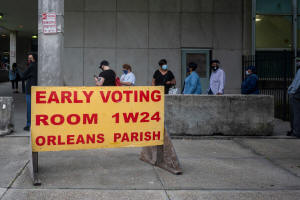U.S. Supreme Court allows Louisiana electoral map faulted for racial
bias
 Send a link to a friend
Send a link to a friend
 [June 29, 2022]
By Andrew Chung [June 29, 2022]
By Andrew Chung
WASHINGTON (Reuters) -The Supreme Court on
Tuesday reinstated a Republican-drawn map of Louisiana's six U.S. House
of Representatives districts that had been blocked by a judge who found
that it likely discriminates against Black voters, a setback for
Democrats as they try to retain control of Congress in November's
elections.
The justices granted a request by Louisiana's Republican secretary of
state to put on hold U.S. District Judge Shelly Dick's injunction
requiring a new map that has a second district where Black voters
represent the majority of voters rather than just one in the version
adopted by the Republican-led state legislature.
The conservative-majority nine-member court's three liberal justices
dissented from the decision.
Democrats control the U.S. House by a slim margin, making every seat
vital in Republican efforts to wrest control from President Joe Biden's
party one or both chambers of Congress in the midterm elections.
The New Orleans-based 5th U.S. Circuit Court of Appeals on June 12 had
refused to reinstate the Republican-drawn Louisiana districts, calling
evidence presented by Black voters who challenged the map "stronger"
than evidence presented in defense of the map.

The plaintiffs said in their lawsuit that the Republican-drawn map
maximizes "political power for white citizens" by packing large numbers
of Black voters into a single district and dispersing the rest into the
five others where they are too few to elect their preferred candidates.
The Louisiana legislature passed the map in February. Democratic
Governor Jon Bel Edwards then vetoed it criticizing it for failing to
include a second Black-majority district considering that Black voters
comprise almost a third of the state's population - but the legislature
overrode the veto.
Democrats have accused Republicans of exploiting state legislature
majorities to draw electoral maps that dilute the clout of Black and
other minority voters, who tend to support Democratic candidates.
Republicans have said the consideration of race in drawing electoral
maps must be limited.
[to top of second column]
|

People line up to cast their ballot for the upcoming presidential
election as early voting begins in New Orleans, Louisiana, U.S.,
October 16, 2020. REUTERS/Kathleen Flynn

After the map was challenged by groups of Black
voters - one alongside civil rights groups including the Louisiana
NAACP - the judge ruled that the way it was drawn likely violated
the Voting Rights Act. That landmark 1965 federal law for decades
has been used to counter racially biased actions in voting and
drawing electoral districts.
The plaintiffs said that in Louisiana, "stark racially polarized
voting almost universally leads to the electoral defeat of
Black-preferred candidates."
Louisiana Secretary of State Kyle Ardoin said in his legal filing
that the judge's order to adopt a second majority-Black district
requires race to predominate in the map-making process, in violation
of the U.S. Constitution's 14th Amendment guarantee of equal
protection under the law.
The Louisiana dispute mirrors one from Alabama that the Supreme
Court has already agreed to hear that could further weaken the
Voting Rights Act. Arguments in the Alabama case are scheduled for
Oct. 4. The eventual ruling, due by the end of June 2023, could make
it harder for courts to consider race when determining whether an
electoral district map violates the Voting Rights Act's Section 2,
which bars voting practices that result in racial discrimination.
The Supreme Court's order on Tuesday said they justices would take
up the Louisiana case and hold it until it decides the Alabama case.
The Louisiana case is among dozens of legal challenges nationwide
over the composition of electoral districts, which are redrawn each
decade to reflect population changes as measured by a national
census, last taken in 2020.
In most states, such redistricting is done by the party in power,
which can lead to map manipulation for partisan gain.
In a ruling last July in favor of Republican-backed voting
restrictions in Arizona, the Supreme Court made it harder to prove
violations under Section 2.
(Reporting by Andrew Chung; Editing by Will Dunham)
[© 2022 Thomson Reuters. All rights
reserved.]
This material may not be published,
broadcast, rewritten or redistributed.
Thompson Reuters is solely responsible for this content.
 |